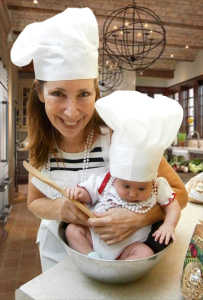“People who love to eat are always the best people.” — Julia Child
Over 6’2″ tall with a voice described as, “careening effortlessly over an octave and could make an aspic shimmy,” Julia Child (August 15, 1912-August 12, 2004) was an unlikely hero and loved by millions.
Whether it was resuscitating a soufflé, coddling a thinned bechamel sauce or flipping an omelet and having it splatter all over the stove, Julia had no fear in making mistakes—even in front of an audience. “Well, that didn’t go over well,” she smiled into the TV camera. “Remember if you’re alone in the kitchen, who’s going to see?”
The great thing about Julia was for someone who wasn’t trying to be funny, she was sheer delight.
And who can forget this Saturday Night Live classic?
Born and raised in Pasadena, California into a family of middle-class privilege, Julia had no great aspirations or focus growing up. “I am sadly an ordinary person with talents I do not see,” she wrote in her diary.
But all that changed with the onset of WWII. She went to work for the Office of Strategic Services (OSS), met and married Paul Child then the two moved to France where he was next posted. Interestingly enough it was fate at first bite. While en route to their new home, Paul brought Julia to La Couronne in Rouen where they dined on oysters portugaises on the half-shell, sole meunière browned in Normandy butter and a whole bottle of Pouilly-Fumé. “The whole experience was an opening for me,” she later wrote. “I was hooked, and for life, as it turned out.”
Suddenly eager to learn everything there was to know about cooking for a person who considered herself a walking disaster in the kitchen, Julia promptly enrolled at the Le Cordon Bleu where she began to hone her craft within an all-male environment. A craft that soon went to a new level during a chance meeting in Paris with two French women, Simone Beck, and Louisette Bertholie; who were in the process of writing a French cookbook geared for an American audience. Only they were lacking an American collaborator. And believing she was the perfect person for the job, Julia leaped at the opportunity.
Little did she realize that this would turn out to be a massive undertaking. One that would consume her life, and consistently challenge Julia’s notions about integrity and creative freedoms that still somehow remain virtually unchanged in the fifty-some odd years since.
In a 1958 letter to Avis DeVoto, one of Julia’s greatest champions and confidants, she wrote:
Hell and damnation, is all I can say. Why did we ever decide to do this anyway? But I can’t think of doing anything else, can you?”
Ten years. Ten relentless years. That’s how long it took Julia to finally complete the now famous, Mastering the Art of French Cooking. In between moving from Paris to Marseilles to Bonn to Oslo and finally to Washington, DC. Followed by six more years just trying to get it published. After shifting away from Ives Washburn, a small publisher, then being rejected by Houghton Mifflin, the book was finally picked up by Alfred Knopf. And as they say, “The rest is history.”
It’s been fifty-eight years since Mastering the Art of French Cooking was first published. And with Julie Powell’s 2009 book, Julie and Julia: My Year of Cooking Dangerously, followed by the move version Julie and Julia, written by the masterful Nora Ephron, Julia is as popular as ever. Someone we can all relate to. If not aspire to.
As far back as I can remember, cooking had always been my first love. Well, baking actually. When The French Chef aired on PBS in 1963, I was ten and utterly mesmerized by this unusual-looking woman wearing pearls, smacking things around in this makeshift kitchen, while laughing at herself saying things like, yum and hooray and oh goodie. This was at a time when television was still in its infancy, so to speak. We didn’t have shows like this. And we certainly weren’t used to the informality surrounding her show, let alone the premise. Regardless it obviously struck a chord with other viewers because the show ran for ten years and won numerous awards. For me, it was all about what might come next.
After graduating high school, after a short stint at a Boston college and being out in the world working as a secretary (do they use that word anymore?), I was miserable. I wanted to be doing something I loved. And making someone’s coffee every day wasn’t my idea of a dream job come true. So with the help of two generous parents, armed with my bibles (Joy of Cooking, Art of Fine Baking and Mastering the Art of French Cooking), I went to culinary school and turned a corner. Would I have ever imagined such a career had it not been for my Easy Bake Oven and Julia? Like all those deep-pondering questions where the answer remains elusive, so does this one. Her mark on me is as indelible as time.
When most people think of Julia Child, chef and a best-selling author are the labels at the top of the list. But she was so much more than that. She was an inspiration to generations of future cooks and bakers, a pioneer, a cancer survivor, the first woman inducted into the Culinary Institute of America’s Hall of Fame, and she was the recipient of the Presidential Medal of Freedom. She left behind a legacy that far surpassed what French culinary marvels she brought to the American masses. She taught us how important it is to hold onto what we love and to persevere—no matter how many times you fall.
So happy birthday Julia. And Bon Appetit!
* * * *
No Comments -Leave a Comment






